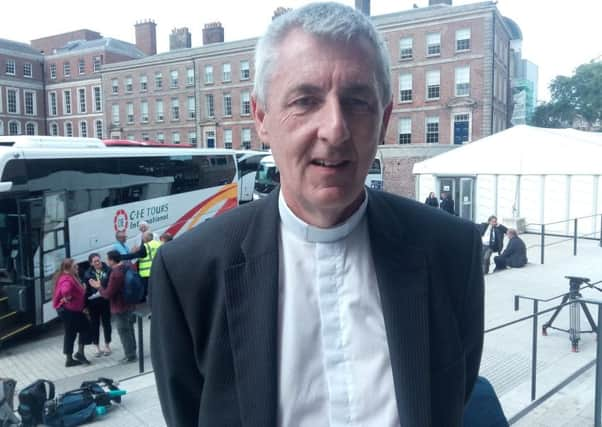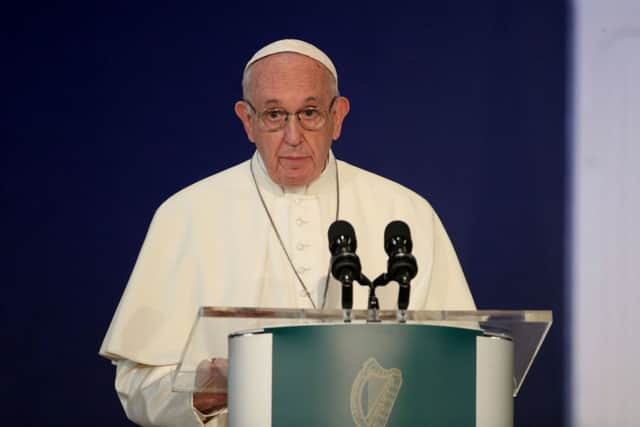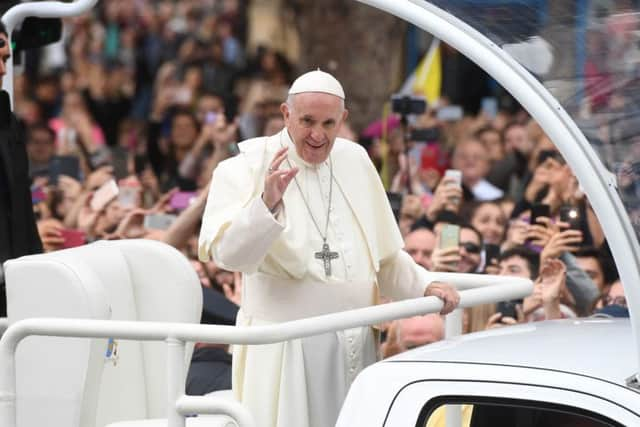Presbyterian moderator: '˜I came to see pope in order to reach out to our Catholic friends'


Rev Charles McMullen was at Dublin Castle on Saturday where he listened to a speech given by Pope Francis, and was then present at a reception which the pontiff also attended.
In the evening, the head of the Presbyterian Church in Ireland was at Croke Park, for the Festival of Families – a concert to celebrate the importance of the family and to mark the end of the World Meeting of Families 2018, including performances by Andrea Bocelli, The Riverdance Troupe, Nathan Carter, Dana Masters and Daniel O’Donnell.
Advertisement
Hide AdAdvertisement
Hide AdSpeaking to the News Letter from Dublin Castle, Rev McMullen said that the theme for his year as moderator is “building relationships” and that was one reason why his presence at the papal visit was appropriate.


“Christ’s love compels us, and in the context of that theme it has been very important to reach out to our Catholic neighbours and friends on a day that is very historic for them as Pope Francis comes to Ireland,” he said.
Asked about the theological critics, from within evangelical and fundamentalist Christianity Protestantism, of his presence in Dublin, Dr McMullen said: “Everyone is entitled to their point of view.”
Then he added: “There are profound doctrinal and theological differences between the Roman Catholic church and ourselves and I don’t want for one moment want to minimise any of them, but today first and foremost has been about reaching out the hand of friendship to our neighbours here in Ireland.”
Advertisement
Hide AdAdvertisement
Hide AdPressed on whether he thought more unionist politicians should have attended papal events over the weekend, Rev McMullen said: “That is entirely a matter for politicians of any description.


“When it comes to peace and peacemaking here in Ireland, Northern Ireland in particular, these gestures have been very important over the years.
“And perhaps by my visit here today I have been able to contribute something even in a very small way in that sense.”
In 1979, when Pope John Paul II came to Ireland, the clerk of the Presbyterian General Assembly met him, as did other members of the church, but the then moderator did not.
Advertisement
Hide AdAdvertisement
Hide AdIn 2010 the then clerk of the General Assembly met Pope Benedict in Edinburgh, and the same year the then moderator attended a service in Westminster Abbey at which Pope Benedict was present.
Dr McMullen said that he did not actually get to shake hands with the pope at Dublin Castle on Saturday, but that the pontiff had “passed all of us by” at the reception.
He added: “He comes across as someone who is very humble and gentle. There’s a great humanitarian concern and I followed his speech with great interest.”
In his address at the castle’s St Patrick’s Hall, Pope Francis spoke of his pain and shame at the failure of church authorities to tackle the grave scandal of clerical abuse in Ireland.
Advertisement
Hide AdAdvertisement
Hide Ad“With regard to the most vulnerable, I cannot fail to acknowledge the grave scandal caused in Ireland by the abuse of young people by members of the church charged with responsibility for their protection and education,” he said.
“The failure of ecclesiastical authorities – bishops, religious superiors, priests and others – adequately to address these repellent crimes has rightly given rise to outrage and remains a source of pain and shame for the Catholic community.
“I myself share those sentiments.”
On Northern Ireland, the pope praised those who helped forged the Belfast Agreement in 1998.
In an apparent reference to the political deadlock in Northern Ireland, which has seen the Province without a devolved government for 20 months, Francis said: “We can give thanks for the two decades of peace that followed this historic agreement, while expressing firm hope that the peace process will overcome every remaining obstacle and help give birth to a future of harmony, reconciliation and mutual trust.”
Advertisement
Hide AdAdvertisement
Hide AdThe speech came after a private meeting with Ireland’s Taoiseach Leo Varadkar.
Mr Varadkar, in his own later address at Dublin Castle said, that there had to be zero tolerance for those who abuse and anyone who facilitated them.
“Wounds are still open and there is much to be done to bring about justice and truth and healing for victims and survivors,” he said.
“Holy Father, I ask that you use your office and influence to ensure this is done here in Ireland and across the world.”
Advertisement
Hide AdAdvertisement
Hide AdMr Varadkar said he hoped the Pope’s visit marked a “new chapter” in Ireland’s relationship with the Catholic Church.